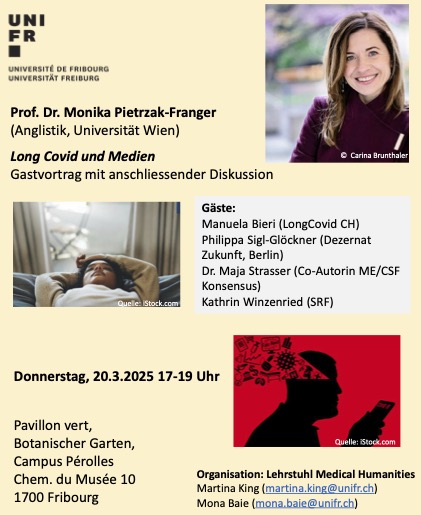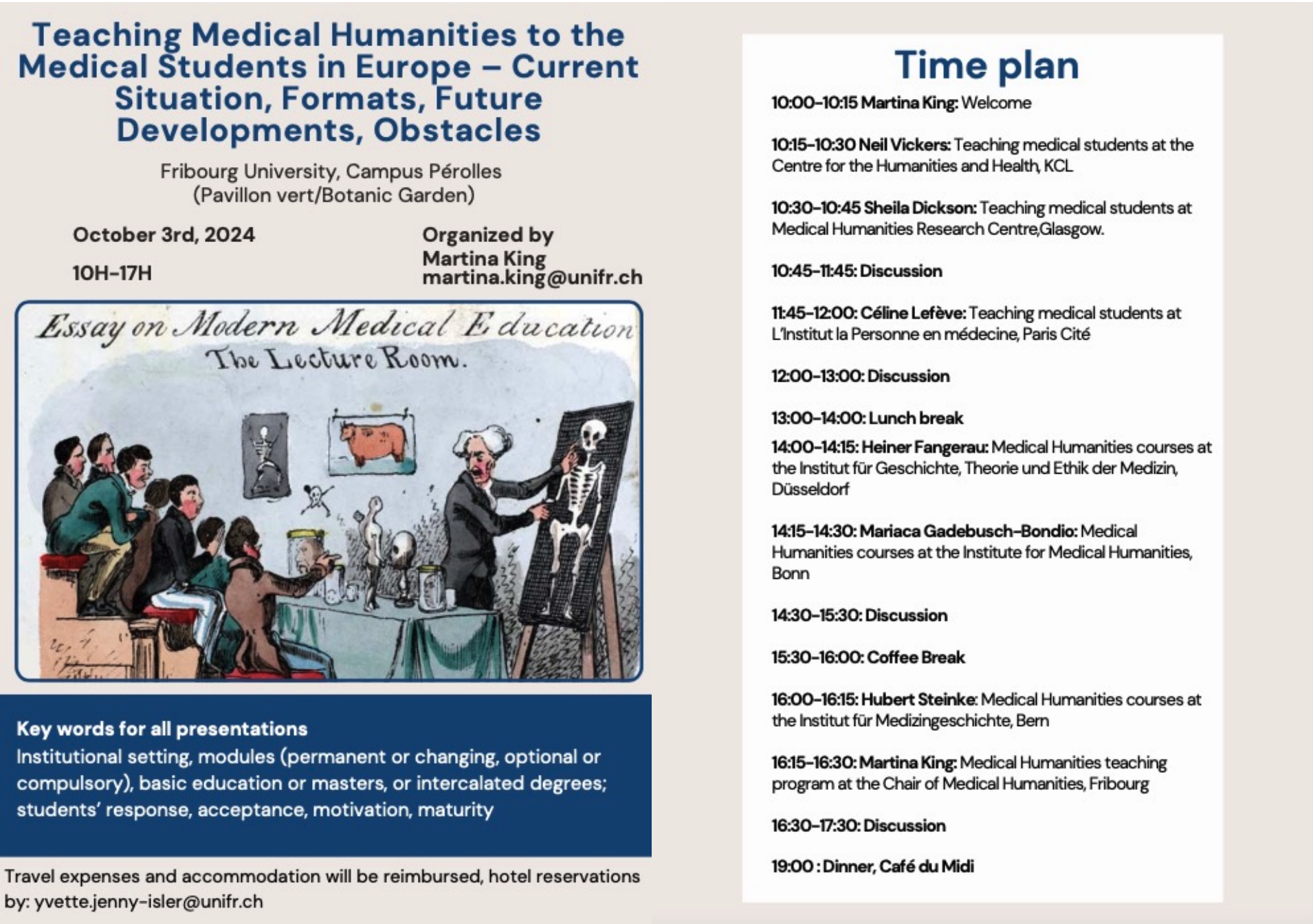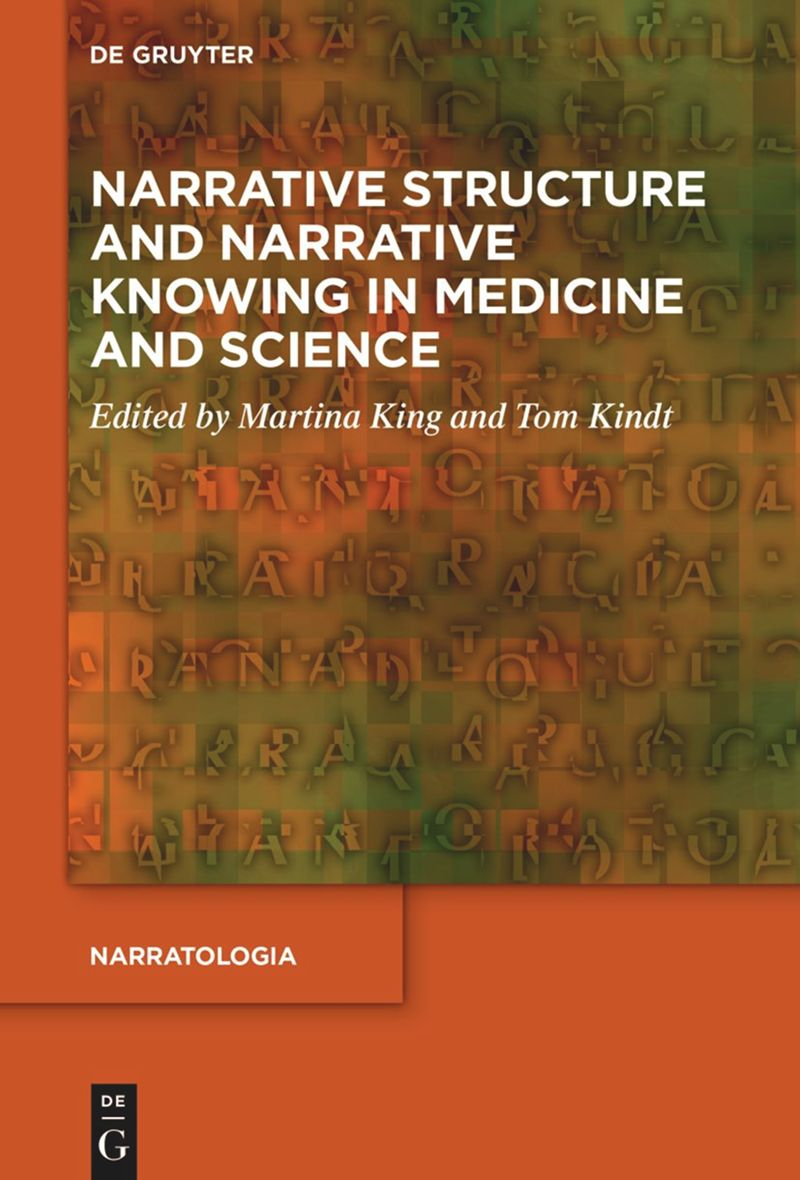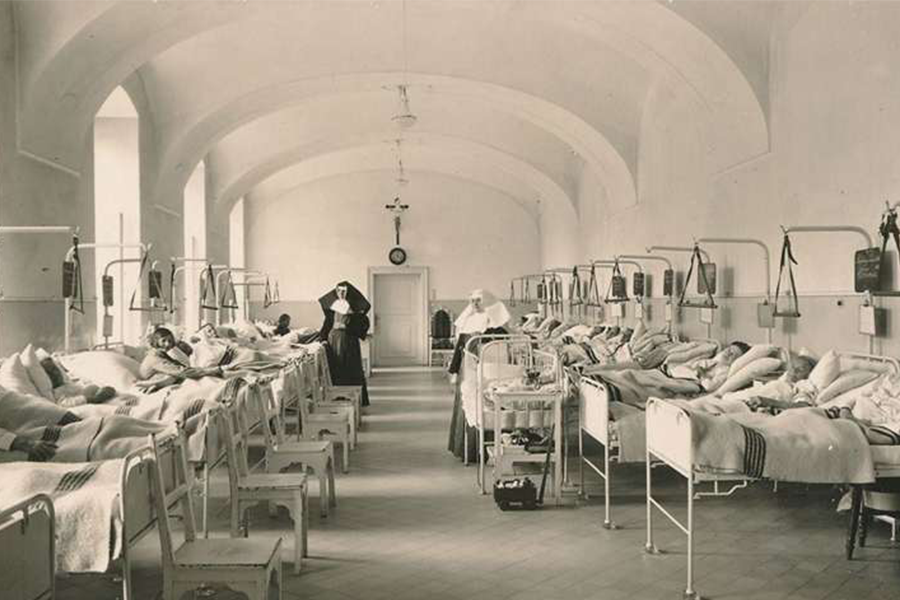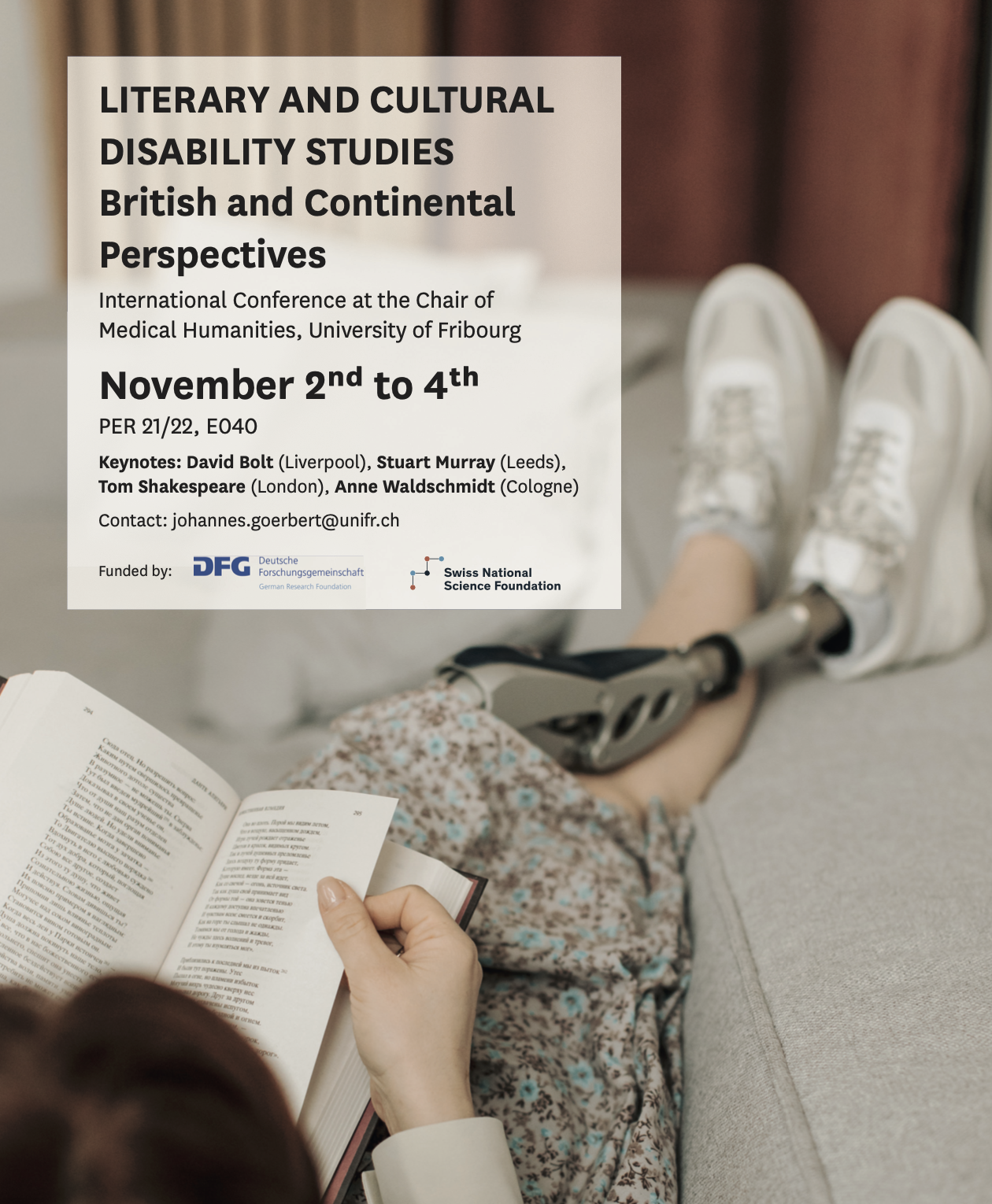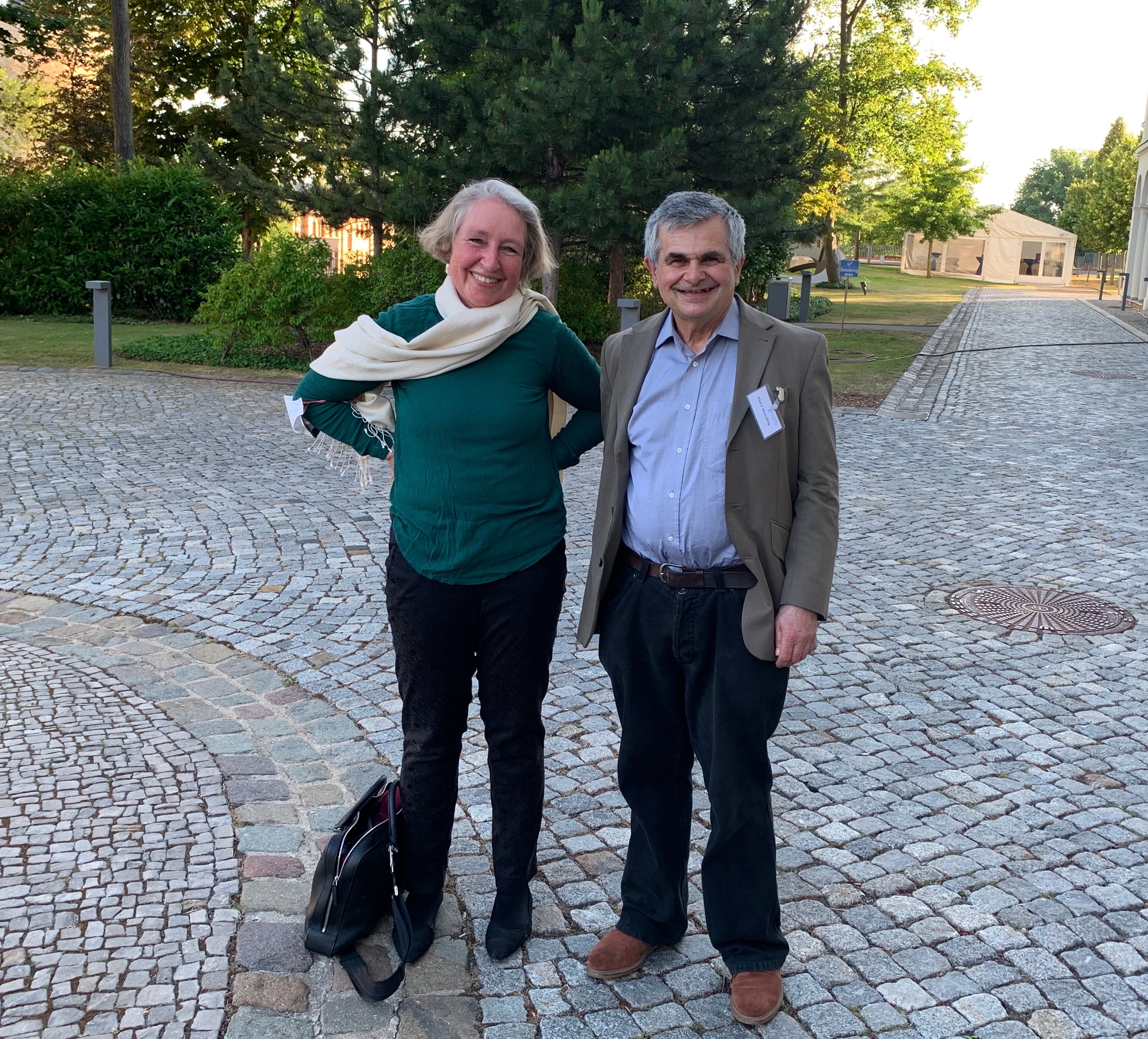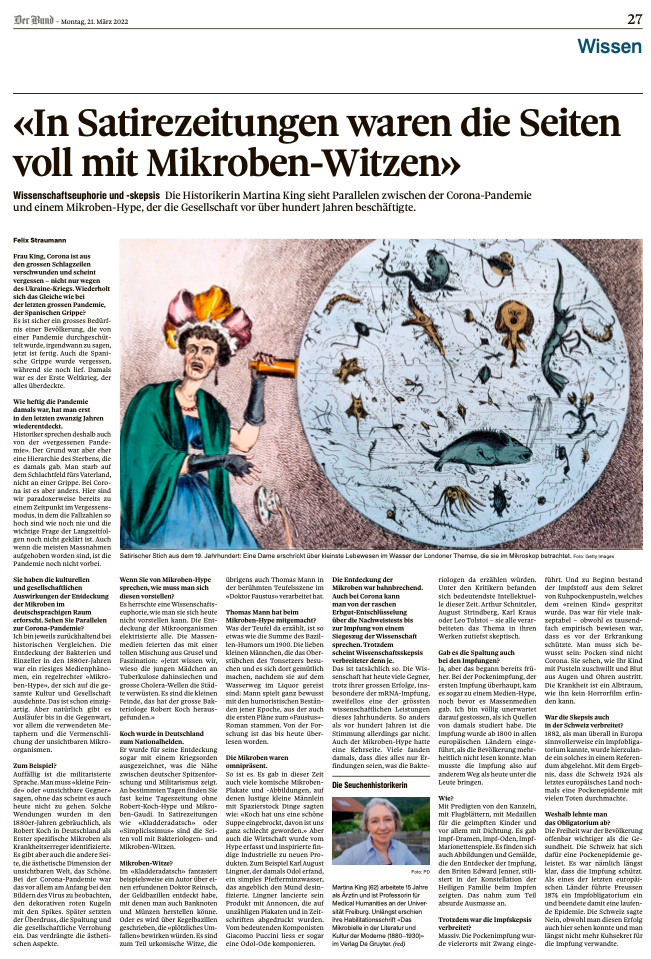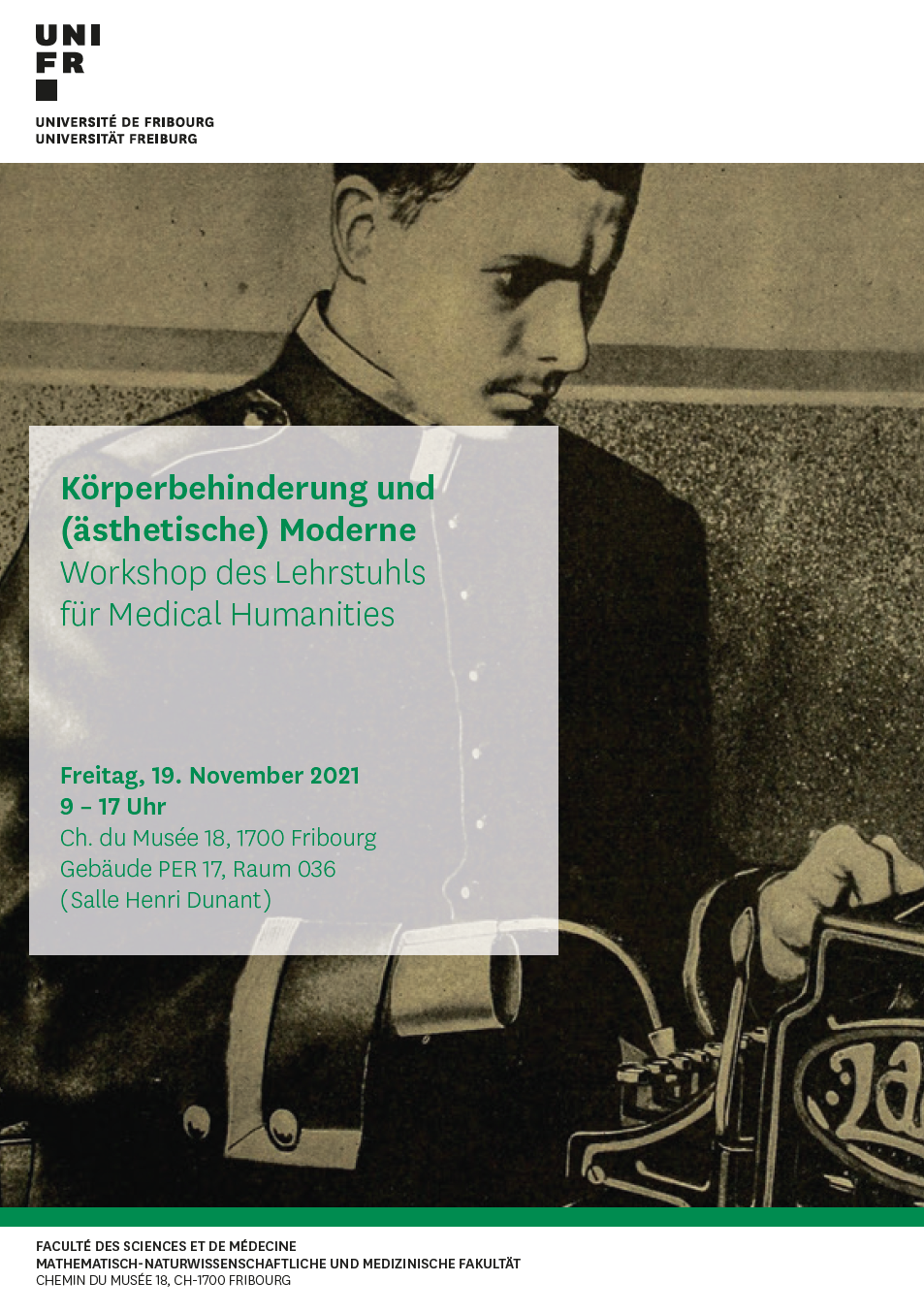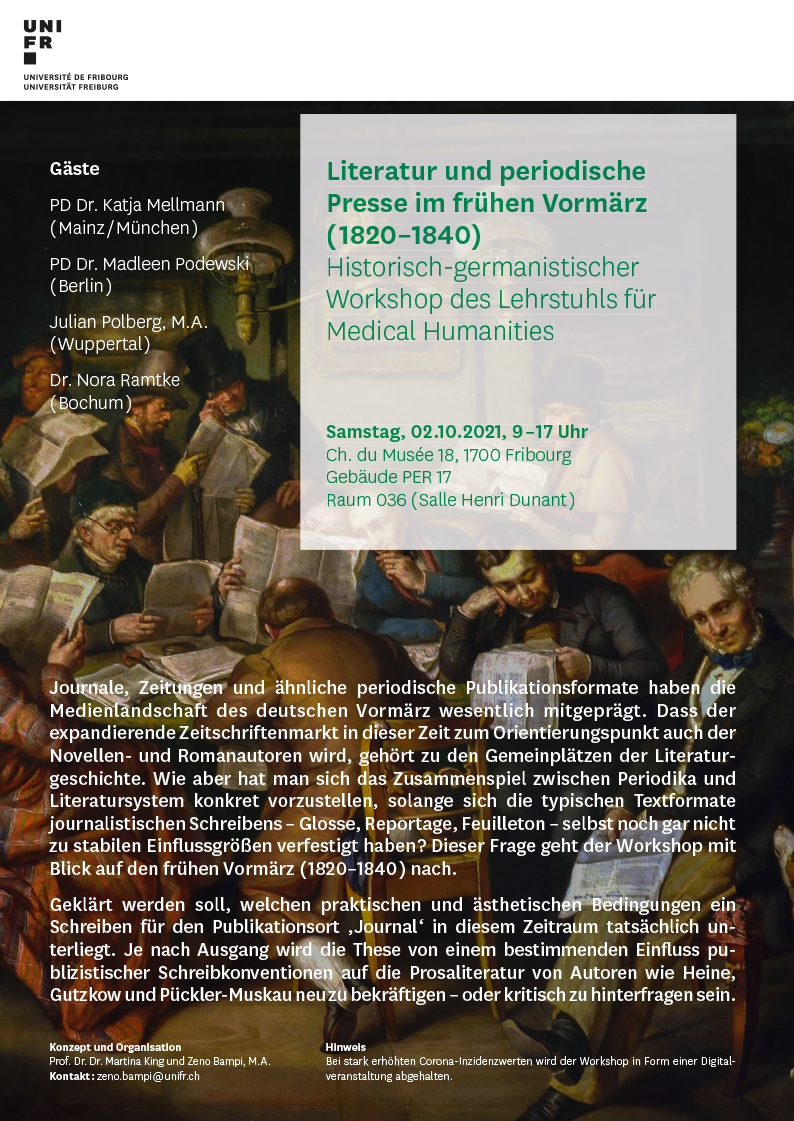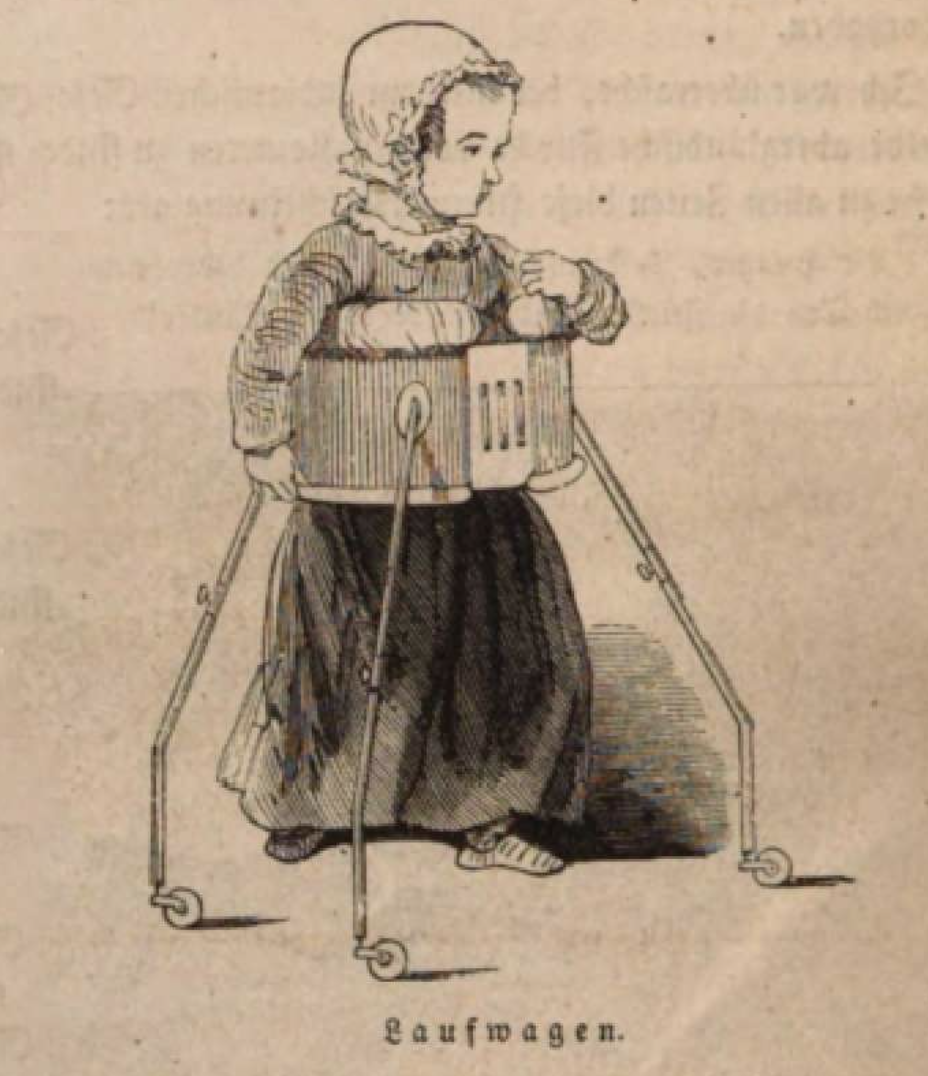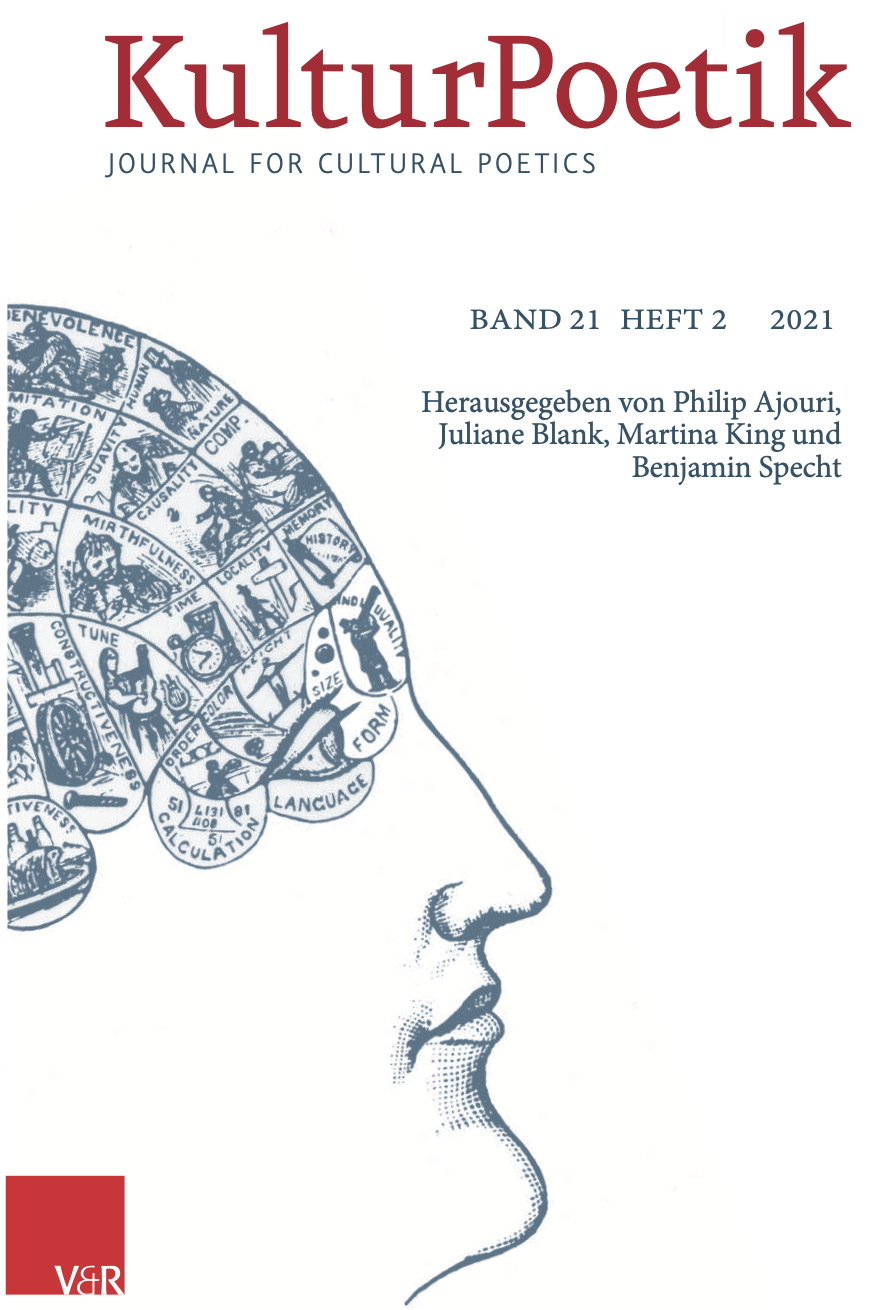News
Modern German Literature/Medical Humanities, Fribourg
Medical Ethics/Medical Humanities, Lausanne
History of Medicine/Medical Humanities, Lausanne
Campus Pérolles, Pavillon Vert (Botanic Garden)
The conference brings together historians of medicine and of architecture, scholars from spatial and literary studies and healthcare architects – in order to stimulate interdisciplinary discussion on medical spaces, their history, significance and social dynamics.
Guest lecture by Prof. Dr. Monika Pietrzak-Franger on the topic Long Covid and media
20.3.2025, 5-7 pm
Lecture followed by a discussion
Pavilion vert, Botanical Garden
Pavillon Vert/Botanic Garden
Organised by Martina King
The question of teaching medical students, and in which form, has become more and more pressing and decisive for the Medical Humanities in the past years. We consider the Medical Humanities a unique possibility to give all medical students an external perspective on clinical practice and medicine in general - on roles and rituals, ethical principles and communication practices. With this aim in view, the Medical Humanities should become a mandatory part of the medical curriculum; however, this is rarely realised and still an issue of debate and controversies.
The sixth and last lecture of the Swiss Seminar in the History of Medicine will take place at the University of Fribourg (Pavillon Vert, Jardin botanique, Chemin du Musée 6, 1700 Fribourg) on May 30 from 17h-18:30h.
Prof. Philipp Osten (Universitätsklinikum Hamburg-Eppendorf) will talk about “Omnadin: A Vaccine Against Everything.“
If you would like to participate but cannot make it in person, you can join us via zoom using the following link:
Felix Rietmann has been awarded the prize of the German professional association for the history of medicine [Förderpreis des Fachverbands Medizingeschichte e.V] 2024 for the publication “Mother-blaming revisited: Gender, cinematography, and infant research in the heyday of psychoanalysis” (History of the Human Sciences 37(2): 87-116). The prize honors "work that stands out in terms of excellence and originality and provides new impulses for the history of medicine.” The award ceremony will take place during the association’s annual meeting in June 28 in Mainz.
Workshop at Medical Humanities Chair, 5.5.-6.5.2024
Kanon: Etablieren, Abschaffen, Sinn? Ein altes Problem aus neuer transdisziplinärer Sicht
Organization
Martina King (Medical Humanities, Universität Fribourg)
Richard King (Geschichte der Philosophie, Universität Bern)
Speakers
Mona Baie (Fribourg), Reinhold Bernhardt (Basel), Elisabeth Hsu (Oxford), Tom Kindt (Fribourg), Richard King (Bern), Andreas Mauz (Zürich)
Summary
Der Workshop thematisiert Kanon und Kanonizität in verschiedenen geistes- und kulturwissenschaftlichen Disziplinen: Theologie, Philosophie, Medizinethnologie, Medical Humanities und Literaturwissenschaft. Wir gehen von der Annahme aus, dass Kanones historisch im Zuge der disziplinären Ausdifferenzierung mit unterschiedlichen Graden von Notwendigkeit versehen wurden, dass dieser Prozess noch unabgeschlossen ist – und dass die Theologie hier eine Sonderposition hat, da sie in hohem Maß an einen festen Kanon und dessen Autorität gebunden ist. Historiographische und textanalytische Disziplinen kommen wohl mit weniger Kanonizität bzw. Kanon-Korpora aus und die Philosophie als systematische Disziplin mit dem Ziel gültiger Argumente (und nicht plausibler Textinterpretationen) wird möglicherweise sogar vom Geltungsanspruch eines Kanons eingeengt. Der Workshop ist eine gemeinsame Veranstaltung des Lehrstuhls für Geschichte der Philosophie der Universität Bern und des Lehrstuhls für Medical Humanities der Universität Fribourg.
The event is open to the public; please register in advance at the following addresses: martina.king@unifr.ch oder richard.king@unibe.ch
Interview with patients, GPs and Martina King, SRF podcast and Radio SRF 3, 7.4.2024, 20:03
“The Best Therapeutic Option? “Elective” Interventions and the Rise of Modern Surgery (1860s-1920s)” at University of Fribourg (PER 21, Room D130, Bd de Pérolles 90, 1700 Fribourg) on 21 March 2024 from 17h-18:30h.
The clinical ward in medical history:
spatial climax of multiple interrelations
Chemin du Musée 18
1700 Fribourg
Past news
-
2023
New publication (December 2023)
Martina King, Tom Kindt (Eds.): Narrative Structure and Narrative Knowing in Medicine and Science (Narratologia, De Gruyter 2023)We all think in the narrative mode, both in everyday life and in science; the latter, however, has only rarely been investigated by narratologists. The volume addresses this blind spot by analysing only non-fictional texts through the lens of both classical and postclassical narratology – from Aristotle to quantum physics and from nineteenth-century psychiatry to early childhood psychology. The articles examine the role that event-sequencing plays within scholarly and scientific communication at various points in history – and the diverse functions it serves such as eye witnessing, making an argument, inferencing or reasoning. Thus, they provide a new methodological framework for both literary scholars and historians of science and medicine.
SRF interview on 23.12.2023 with Chantal Britt and Martina King about LongCovid
New research project (PI: Prof. Martina King)
"Narrating medical spaces in literary prose in the long 20th century"SNSF project funding, 2023-2027
The project explores forms and functions of medical spaces in literary prose from the early twentieth century to the present, contributing to our understanding of the role of literature in the ongoing process of medicalisation.
Collaborators: PD Dr Matthias Aumüller (senior researcher) and Dr Mona Baie (doctoral student), Anna-Marie Joos (research assistant).
With a public lecture series on the topic of ‘hospitals’; speakers are eminent writers, medical historians, ethicists, and hospital architects.
Wednesday, 6.9. 2023 5-7pm, Pavillon vert:
David Wagner:
Sickrooms, corridors, hospital wards:
on the psychogeography of the hospital in 'Life'Friday, 15.3.2024, 5-7pm, Pavillon vert:
Alfons Labisch:
The sickroom from the perspective of medical history:spatial culmination of multiple referential systems
Further lectures by Hans Nickl (München), Samia Hurst (Genf) und Brian Hurwitz (London), detailed information soon.
International Conference at the chair of Medical Humanities,
2.-4.11. 2023“Literary and Cultural Disability Studies. British and Continental Perspectives”
(Funded by the German Research Foundation, the Swiss National Science Foundation and the Centenary Fund of the University of Fribourg)
Keynotes: David Bolt (Liverpool), Stuart Murray (Leeds), Tom Shakespeare (London), Anne Waldschmidt (Cologne); further speakers: Jenny Bergenmar (Gothenburg), Ria Cheyne (Liverpool), Harriet Cooper (Norwich), Michael Schillmeier (Exeter).
The event is part of a series of conferences of the current network “Inclusive Philology”, funded by the German Research Foundation (DFG) and co-initiated by Klaus Birnstiel (Greifswald) and Johannes Görbert (Fribourg). Its aim is to firmly establish literary disability studies in the German-speaking countries, in close connection with international actors.
Evening Lecture by Prof. Dr. Hans-Jörg Rheinberger: "Knowing and Narrating".Friday, 20 October 2023 | 6 pm, Pavillon Vert (Botanical Garden Fribourg)Awarding of the Piller family prizes for the best medical students' essays in "reflective writing"
At the Bachelor Degree Ceremony of the Faculty of Science and Medicine on 28 October 2023, the prizes for the writing exercise in Medical Humanities were awarded byEdouard Piller (representative of the Fondation Joseph & Marie-Anne, Piller) and Dr. Johannes Görbert (Medical Humanities Team) to the students Alizée Lorenz and Stella Zimmerli.
Photo gallery (Graduation Ceremony)
-
2022
Workshop in German Studies:
Intermediality, Dialogism and Concepts of 'Oeuvre' in German Avantgarde Movements08.10.2022, 9:00-17.45, Pavillon vert (Botanical Garden)
Public lecture by Martina King, National Academy of Sciences, Leopoldina
13.06.2022, Halle (Saale)
Heroes, Saints, Eugenicists: The ‘doctor’ in Nazi novels - in the context of dictatorship
Interview with Martina King
21.03.2022, Der Bund
Wissenschaftseuphorie und -skepsis: Martina King sieht Parallelen zwischen der Corona-Pandemie und einem Mikroben-Hype, der die Gesellschaft vor über hundert Jahren beschäftigte.
Interview with Martina King
04.03.2022, Bieler Tagblatt
Die Freude über die Aufhebung der Coronamassnahmen sei verständlich, aber auch riskant, sagt die Seuchenhistorikerin Martina King. Rückblick auf eine Pandemie, die noch gar nicht zu Ende ist.
Meeting HSSuisse 2022
20.05.2022 | 9.30 – 18 Uhr, Pavillon Vert (Botanischer Garten)
This year, the annual history of science meeting for early career researchers in Switzerland is hosted by the chair for medical humanities (Martina King) and co- organized by Jasmine Lovey and Felix Rietmann. It will take place at the Pavillon Vert on Friday, May 20, 2022. To register please complete the registration form by February 15, 2022. For further information including an overview of the last meetings see: https://hssuisse.ch/, and/or write to jasmine.lovey@unifr.ch or felix.rietmann@unifr.ch.
-
2021
Workshop „Physical Disability and Aesthetic Modernism”
Friday, 19. November 2021 | 9 – 17 Uhr, PER 17, Raum 036
Speakers
Prof. Dr. Klaus Birnstiel, Greifswald
Dr. Mirjam Janett, Bern
Dr. Nils Löffelbein, DüsseldorfModerator
Dr. Johannes Görbert, FribourgInterview with Martina King about the decrease in life expectancy caused by the Corona pandemic
Radio SRF 4 26.10.2021
Workshop: "Literature and the periodical press in the early Vormärz period (1820–1840)"
02.10.2021, Per17, Raum 036
Guests
PD Dr. Katja Mellmann (Mainz / München)
PD Dr. Madleen Podewski (Berlin)
Julian Polberg, M.A. (Wuppertal)
Dr. Nora Ramtke (Bochum)Organisation:
zeno.bampi@gmail.comInterview with Martina King on the history of vaccination
Radio Bayern 2 Kultur, 2.6.2021
Link to transcriptInterview with Martina King: Diseases as divine punishment
Deutschlandfunk Kultur, 6.6.2021
Link to showNew research project
Dr Felix E. Rietmann (Medical Humanities) has been awarded an Ambizione Grant from the Swiss National Science Foundation for the project Raising a Well-Grown Child: Media and Material Cultures of Child Health in the Early Nineteenth Century. Situated at the intersection of media history and the history of medicine, the project explores how notions of health and illness in childhood were articulated in popular magazines and materialized in domestic, medical, and pedagogical practices in German-speaking Europe in the early nineteenth century. The project seeks to contribute to our historical understanding of the relationship between print media and medical knowledge at a time that is considered fundamental for both the emergence of the public sphere and the rise of modern medicine.
New release (october 2021)‘Microbes in Modernism’
On the literary and cultural history of an ephemeral object (1880-1930)
The book traces the everyday cultural, aesthetic, and ethical impact of bacteriology research on the cultural epoch around 1900. It offers an integrated discursive history of the invisible, while also suggesting an alternative view of classical modernity. Its scope extends from naturalistic novels to ideological texts and includes the literary and artistic avant-garde.New editorial board
KulturPoetik. Zeitschrift für kulturgeschichtliche Literaturwissenschaft /Journal for Cultural Poetics betrachtet Literatur als Teil der Gesamtkultur. Sie widmet sich daher den Wechselwirkungen der Literatur im Ensemble der Wissensformen und Kulturtechniken, ihrem Verhältnis zu anderen Medien und Künsten sowie ihrem Beitrag zur kulturellen und interkulturellen Kommunikation. Die Zeitschrift wurde im Jahr 2000 gegründet, ist interphilologisch und interdisziplinär orientiert. Sie veröffentlicht zweimal jährlich Beiträge in deutscher, französischer und englischer Sprache. Neben einem Aufsatzteil enthält jedes Heft auch die Abteilung ‚Forum‘, welche für Statements zu aktuellen Fragen und Debatten der Forschung zur Verfügung steht.
Bis 2021 wurde KulturPoetik herausgegeben von Benjamin Specht (Fribourg), Juliane Blank (Saarbrücken), Manfred Engel (Saarbrücken), Bernard Dieterle (Mulhouse) und Monika Ritzer (Leipzig).
Im Jahr 2021 übernahmen Martina King (Fribourg), Benjamin Specht (Fribourg), Juliane Blank (Saarbrücken) und Philip Ajouri (Mainz) die Herausgeberschaft




